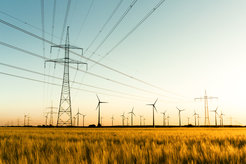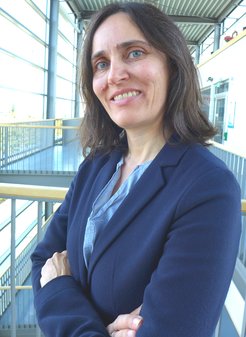Dr.-Ing. Tanja Vidaković-Koch heads a new research group at the Max Planck Institute in Magdeburg

The necessary transition to renewable energies such as solar, hydro or wind power requires new solutions of the underlying fundamental scientific and technological problems. A key feature in this context is the storage of renewable energies, which are in principal abundant but subjected to strong fluctuations. An often discussed scenario in energy storage is the chemical transformation of readily available chemical compounds, such as water or carbon dioxide, into energy sources such as hydrogen or alcohols. Because of the rapid dynamics of electrochemical processes, and their modular nature, which enables the construction of efficient and small production units, it can be surmised that there will be an increased electrification of chemical processes for the use of excess current. In addition to the above-mentioned processes (water and CO2 electrolysis), the chemical industry, in the transition from fossil to renewable resources, requires new processes based on renewable raw materials. Here too, electrochemical and especially bio-electrochemical processes offer an attractive solution.
At present, most of the electrochemical processes that would be suitable for these new challenges are not yet technically mature. In addition to the improvement of existing processes, there is room for conceptually new process designs. Scientific studies of fundamental aspects will play a major role in this. However, the practicality and efficiency of new technological solutions will depend mainly on the design and optimization of electrochemical reactors.
In her research at the Max Planck Institute, Tanja Vidaković-Koch plans to address both, fundamental and application-oriented issues in order to bring electrochemical processes to technical maturity. The major interest is in dynamics of electrochemical processes as in water electrolysis and electroenzymatic processes.
Furthermore, Tanja Vidaković-Koch will continue her work on conceptually new process designs. Within the Max Planck Society's research network MaxSynBio she will focus on the development of a synthetic cell. Her goal in this project is to assemble synthetic cells which can convert chemical energy of a nutrient (“fuel”) or even light into an another energy form, such as ATP or electricity.
The new research group Electrochemical Energy Conversion around Tanja Vidaković-Koch will strengthen the activities on energy research in the Department Process Engineering (Prof. Dr.-Ing. Kai Sundmacher) at the Max Planck Institute Magdeburg.

About Dr.-Ing. Tanja Vidaković-Koch
Tanja Vidaković-Koch studied Chemical Engineering at University of Belgrade in her home Serbia. From 2002 to 2007 she worked as a scientist at the Max Planck Institute Magdeburg. In 2005 she received her PhD from the Otto von Guericke University Magdeburg.
From 2007 to 2011 she worked as a senior scientist in Faculty of Process and Systems Engineering at the Otto von Guericke University Magdeburg.Since 2011 Tanja Vidaković-Koch heads a research team on Enzymatic Fuel Cells and Synthetic Cells in the department Process Engineering (Director Prof. Dr.-Ing. Kai Sundmacher) at the Max Planck Institute Magdeburg.

